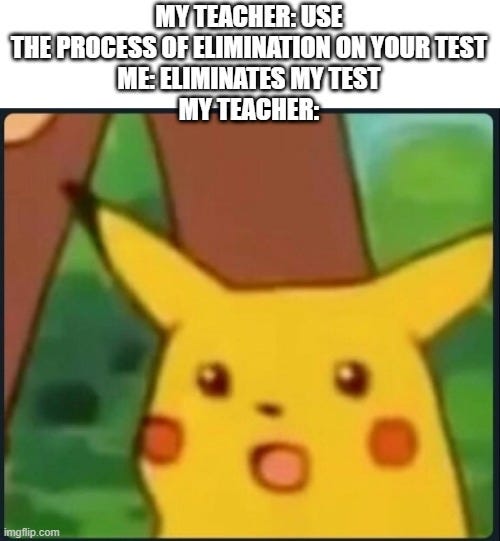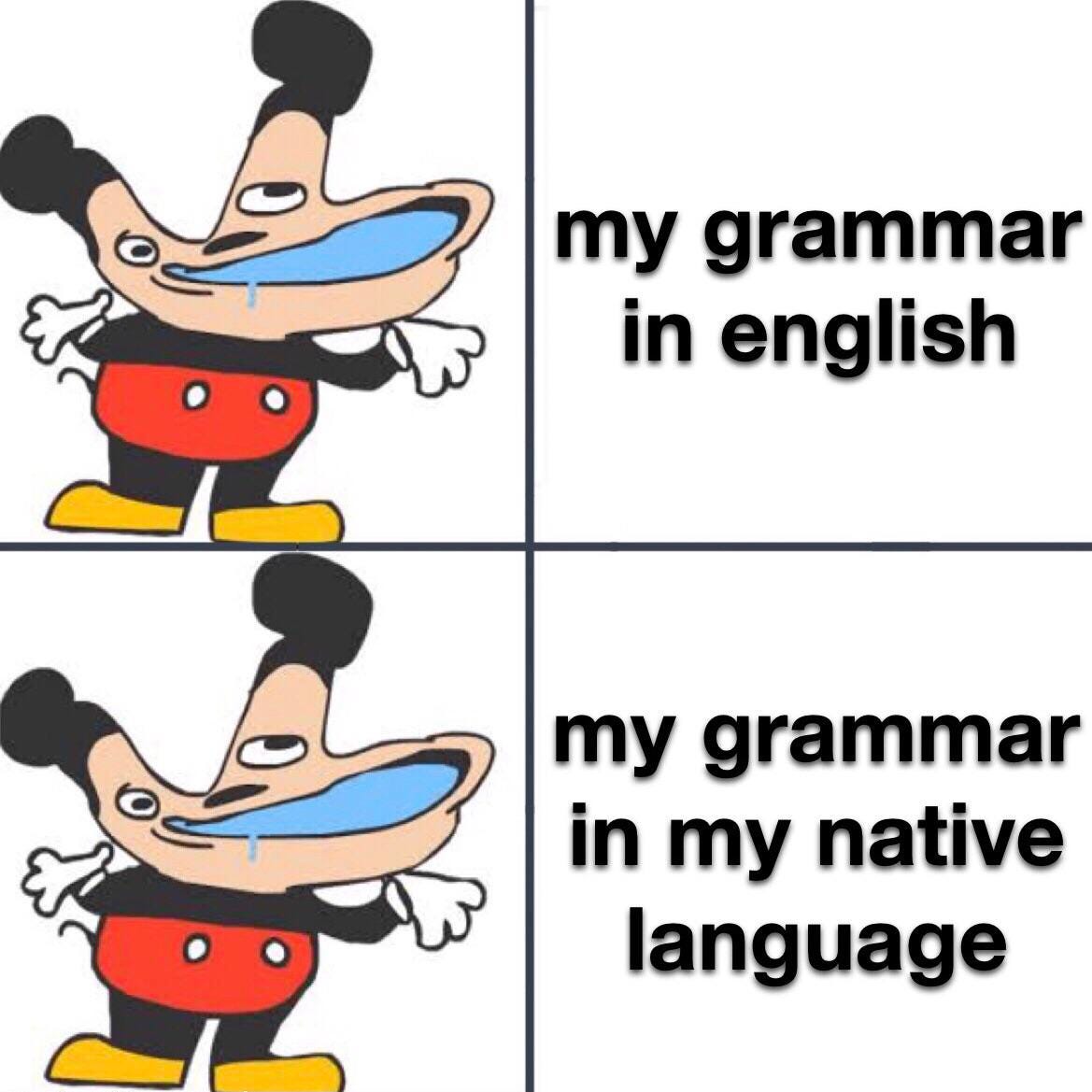You've been eliminated
An underrated method for mastering new concepts
Welcome, aspiring polyglot! Over the past year and a half we have discussed the importance of pattern recognition several times. Something that we haven’t looked at quite as closely though is the process of elimination. This was always one of my favorite tools when it came to test taking. Finding out which of the answers is simply impossible so that you can focus on figuring out which of the viable answers is correct. When it comes to languages, this is something that you can use today to enhance and accelerate your language acquisition.
Using the process of elimination
The times when this will come in handy is going to vary from language to language, but there are some times when it will be almost universally useful. Verb tenses are notoriously difficult and using the process of elimination can be super helpful when it comes to these. Let’s take the example of the past tense for this exercise.
In every romance language there are multiple variations of the past tense and each conjugation has a reason behind it. Learning the reasoning is going to be important, but it will also become a feeling later on in your journey. Until you get to that point, when you are trying to remember which is which and why, the process of elimination will be very helpful.
If you know the exact reason for one of three options, that means you know it is either that one or one of the other two. For the times when it is not the one you know, you can eliminate that option and either try to remember the reasoning behind the other two or make your best guess. A 50% chance will always be better than a 33% chance, but even if you think you will be wrong do not let that stop you from speaking.
Of course your goal is to eliminate your mistakes in so far as that is possible, but even native speakers butcher their mother tongue on a near daily basis. With enough practice you will be able to run through this exercise quickly in your head, and the more you do it the less time you will need it. However, until you get to a point where you can feel the different and the reasons behind using different conjugations, using the process of elimination will open doors for you.
Matching grammar patterns across languages
Out of all the linguistic components you have before you, the one that will benefit most from the development of this skills is hands down verb conjugations. Whether there are ten or thirty conjugations you have to learn, knowing the rules of them all is not a simple task. Some people allow this to hold them back from speaking contributing to a prolonged silent period that is made worse by an analysis paralysis.
Outside of grammar, though, you can use this with your word choice. This is slightly different than the process of elimination. Rather than eliminating from a pool of options and choosing the most likely correct option, you will think of other options. Here is what it looks like in practice:
Let’s say you are trying to think of the word for “entire” in French. You know the word, but it’s just not coming to mind right now. My approach, and my advice to you, is to think of some synonyms. How else can you say “entire” in the greater context of your sentence? Whole? Complete? All? Everything?
Say the sentence is, “The entire group was tired”
If you want to keep “entire” you can say, “Le groupe entier était fatigué”
But what if you really can’t think of the word entire? Then find another way.
The whole group = “Tout le groupe était fatigué” (all the group)
The complete group = “Le groupe complet était fatigué”
The totality of = La totalité du groupe était fatigué”
Some of these are certainly more correct than others, but they will all make sense and you will be able to communicate what you want. That is the goal of this method. Not to say the best thing, not to say things perfectly, but to ensure you are able to communicate anything you want with any person at any time.
As you continue down the road with your language acquisition you will slowly but surely begin to learn how to say things “best” but that should not be your initial goal. Communication is far more important than perfection. For more on how to implement choosing the “best” option, for those of you who are down the road on your language acquisition", check out this article:
How to Integrate Choosing the "Best" Option into Your Language Learning Strategies
Welcome, aspiring polyglot! Of all the things you can focus on when learning a new language, expanding your vocabulary is probably one of the most important. Yes, grammar rules matter, but most people do not understand the grammar of their native language, let alone the language they are learning. By using the language enough over time the grammar will …
Once you reach the point where you actually can express yourself in any way you feel necessary, you can use this same skill to get to the next level. In essence, use what you know to grow. Challenge yourself to use different words to express the same things. Expressing yourself is fantastic, but your final end goal should be expressing yourself as eloquently as possible. You want native speakers to be shocked by your knowledge and proficiency.
The power of direct translation
During the times when you are direct translating, and you will be, this technique will be crucial. Often you will come up against a word or phrase where you know how to say all but one word. Using the power of direct translation in conjunction with the ability to find synonyms will provide you multiple paths forward.
Even if one of your options isn’t correct, having another as a backup should give you the confidence to continue on in spite of any fear you may have. For an in depth look at the power of direct translation, make sure to check out this article:
Using Direct Translation for Second Language Acquisition
Welcome, aspiring polyglot! As we know, mainstream advice is generally not worth taking if you are looking to break out of being normal. Approaches to learning a language are no exception to this rule. One of the most atrocious pieces of advice that I find holds most people back is, "it's bad to directly translate". Is direct translation accurate and/or…
Your goal should always be to set yourself up for success and by training your brain to approach things specific ways you can do just that. If you are trained to look for patterns, you will find patterns. When you are trained to think of multiple options you will think of multiple options. Learning how to maximize the utility of the process of elimination will ensure you are able to use it with more and more ease every time you do it.
All of these things will help you break free of the silent period by simply showing you that you know more than you think. Just because you freeze when trying to think of a specific word does not mean you are incapable of expressing the sentiment you seek to express in a different way. Most people get stuck because they want to say something one way. That is just not how things work at the end of the day.
At one point in your language acquisition a switch will flip and you will stop translating and start speaking. You are not saying “the whole group was tired” in French. You are saying “Tout le groupe était fatigué”. That is not a translation. It is not an interpretation. It is French. This is true irrespective of which language you are learning. I cannot tell you when this switch will flip, but it will happen so long as you refuse to give up. I hope you’ll let me know when it happens so I can celebrate with you.
Conclusion
There are countless things you can do to get out of the silent period of language acquisition, but none of them work if you do not realize how much you know. One of the ways I constantly challenge the people I work with is by asking them how they would say something I know they know how to say in another language. Allowing people, or yourself, to default out of your target language and back into your native language is slowing your progress in ways you do not even realize.
Using the above strategies you can truly open your eyes to how much you know. Perhaps you do not know how to say something the way you want to say it, but that does not mean you cannot express the exact same sentiment in another way. Even when you are direct translating in your head you can benefit from thinking of all the English synonyms (or antonyms) and taking a different approach than you originally anticipated. The goal is to start speaking, so start speaking, even if you think you are butchering the language.
As we discuss often around here, creating is vital in second language acquisition. Speaking and practicing with written language will help you in accelerating and enhancing your language learning process, so start having conversations as early on as possible. It will be difficult, but you can do difficult things and be great. So go do some difficult things and become great.
Eager for more Second Language Strategies?
For more content find me on Twitter or Instagram. If you are struggling to get speaking in your target language, get up to 55% off a Babbel subscription using this link. I look forward to seeing everyone’s progress in the months and years to come. Be sure to check out the YouTube channel as well!
Learning Spanish? We have begun aggregating resources in you Spanish Resource Newsletter!
Don't forget to pick up your very own French Language Logbook or Spanish Language Logbook!










